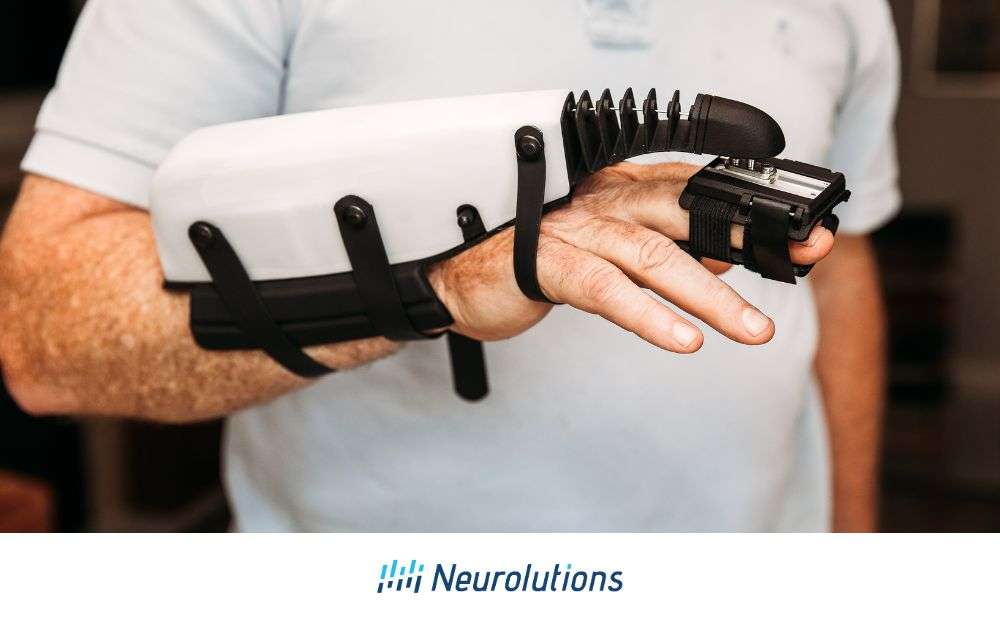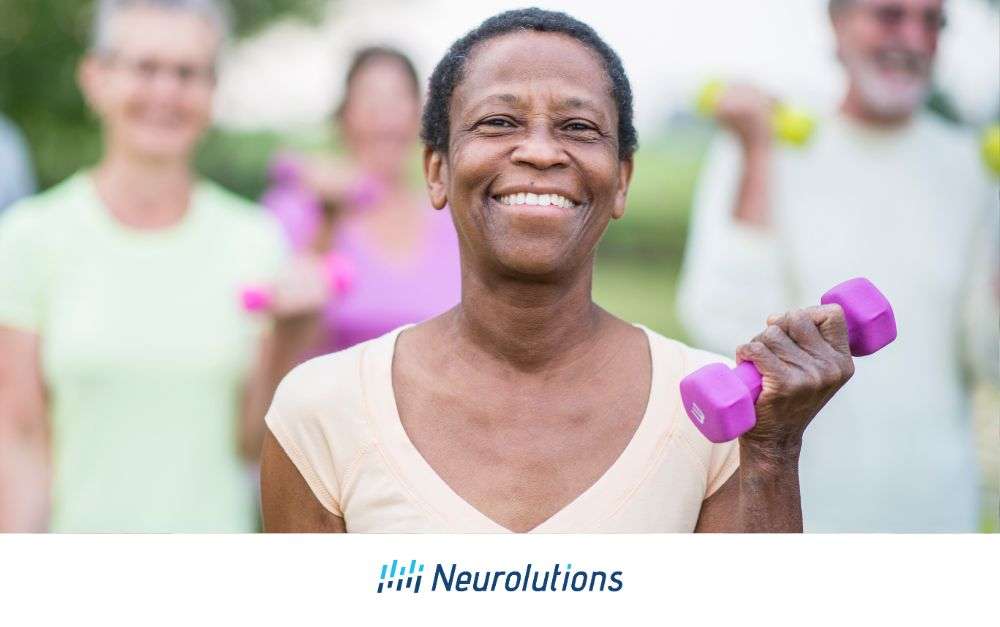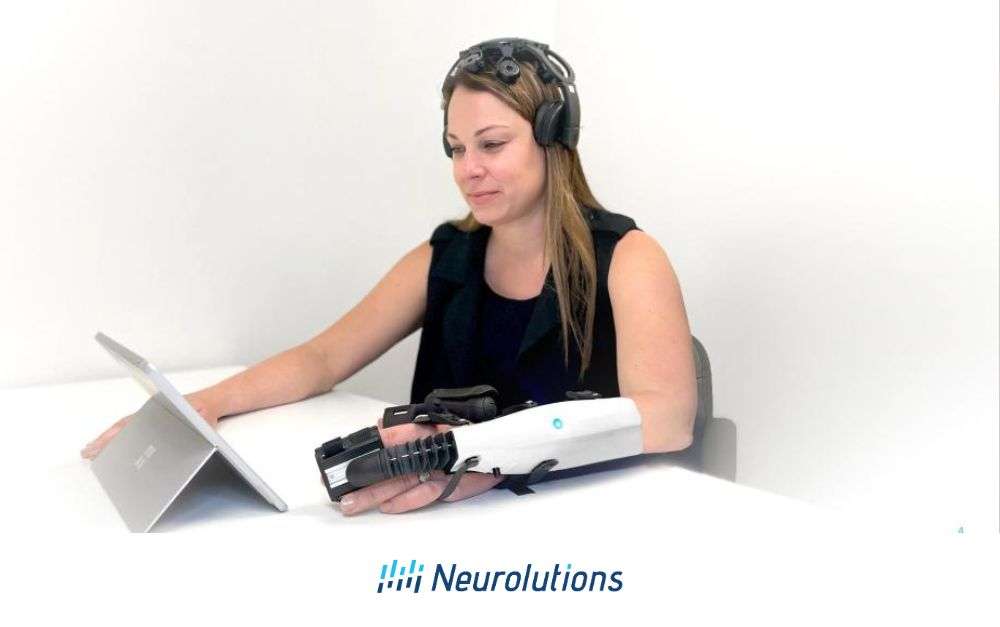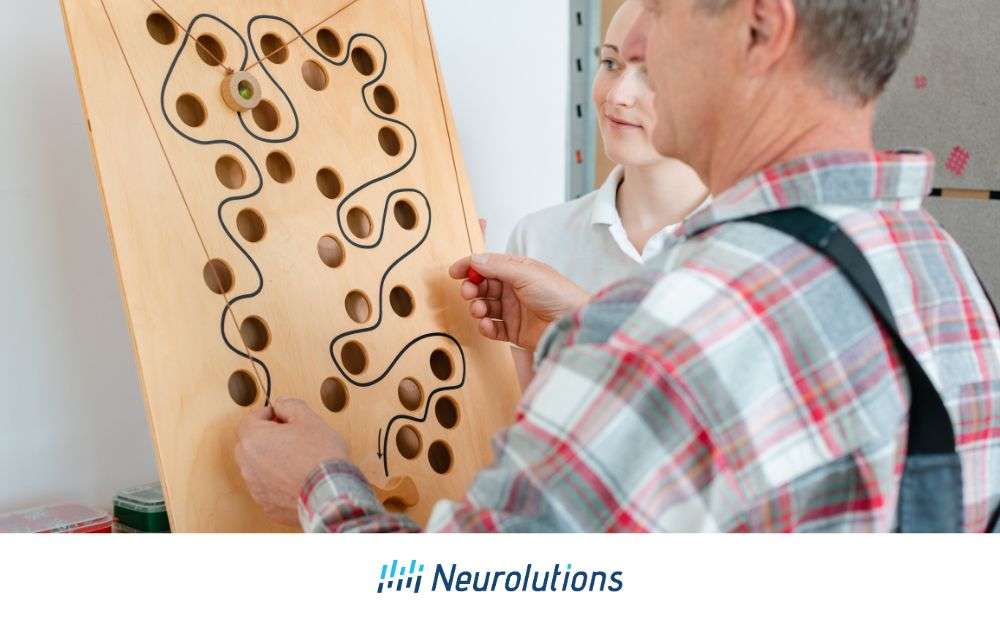How IpsiHand Empowers Stroke Recovery
The Neurolutions IpsiHand Upper Extremity Rehabilitation System is a cutting-edge neurorehabilitation device that is designed to enhance traditional rehabilitation programs by integrating innovative technology into a daily routine. This article will discuss five ways the IpsiHand can enhance the rehabilitation journey. Let’s discuss below:
1. Home-Friendly Rehabilitation and Remote Monitoring to Promote Independence
After receiving skilled training from our product specialist, the system has been carefully designed to empower the user to employ it independently at home, within their own environment, and at a time that suits the user best. Our system has been designed to ensure ease of use, allowing someone to put it on, operate it, and take it off with just one hand. We understand that many stroke survivors may experience paralysis or weakness in one arm, so our system is tailored to accommodate those needs, providing convenience and accessibility in a rehabilitation journey.
The Neurolutions team is equipped to monitor usage and progress remotely, regardless of location, while using the device. This feature can be particularly motivating for users residing in rural areas or facing limitations in transportation and mobility. By remotely tracking usage and progress via support “check-ins”, our team can provide ongoing support, guidance, and encouragement, ensuring that users receive the assistance they need to achieve their rehabilitation goals effectively. This continuous monitoring also allows for timely adjustments to the customized program on their device, maximizing the benefits of the device and facilitating the recovery journey.
2. Be part of the community
Experiencing a stroke can indeed be a frightening and isolating experience. At Neurolutions, we are committed to supporting all users through their journey of recovery and beyond. That’s why we’re proud to offer ongoing community support and engagement initiatives to lift up our users and the stroke survivor network.
One of our key offerings is our monthly community support meetings, facilitated by an occupational therapist on the clinical team from Neurolutions. These meetings provide a safe and welcoming space for all users of the IpsiHand to come together, converse, and share ideas, tips, and tricks for recovery. Whether a user is seeking advice, encouragement, or simply a listening ear, these meetings offer invaluable support. Plus, with the convenience of video chat, a person can join comfortably from wherever they are across the United States.
In addition to community engagement activities, Neurolutions is dedicated to providing real-time technical and clinical support to stroke survivors. Our team is always available to address any questions or concerns, ensuring that our users feel supported every step of the way.
At Neurolutions, we understand that stroke recovery is a journey. We provide support and resources related to device use, and we also encourage safe use of the arm and hand within everyday life to restore function.
3. Motor priming
The Neurolutions IpsiHand brain-computer interface (BCI) technology operates on the principle of the Hebbian Theory, which states that “Neurons that fire together, wire together.” This theory underscores the importance of repetitive and coordinated neural activity in strengthening connections between neurons. In the context of stroke rehabilitation, the IpsiHand system is designed to leverage this principle to promote neuroplasticity and motor recovery.
To optimize the benefits of the IpsiHand System, it is recommended to use it for one hour a day, five days a week. This consistent and structured approach aims to facilitate motor priming, a process akin to “lighting a fire in the brain in the motor cortex.” Through regular use of the system, neural circuits associated with motor function are activated and reinforced, laying the foundation for subsequent motor learning and recovery.
Once the neural “fire” is ignited through motor priming, individuals can begin engaging in functional activities with their affected arm. Strengthened neural connections may enable the execution of purposeful movements. The IpsiHand System serves as a catalyst for this process by providing sensory feedback and facilitating the coordination of hand and arm movements.
Furthermore, continued engagement in attempted functional movements with the affected arm further enhances neuronal firing and strengthens neural connections. The IpsiHand System complements these efforts by promoting synchronous neural activity, thereby facilitating the rewiring of neural networks and promoting motor recovery.
|
Learn More about how BCI Technology is revolutionizing stroke recovery in our deep dive “How Brain-Computer Interface Treatment for Strokes is Helping Patients Recover Faster” |
4. Use of motor imagery in functional activity after using the IpsiHand
When engaging in daily therapy with the IpsiHand System, users tap into the “power of their mind” to control and derive benefits from the device. This mental strategy can extend beyond therapy sessions and be integrated into functional tasks. When attempting to use the affected limb outside of therapy, it’s crucial to leverage the “power of your mind” by visualizing the hand moving as one has experienced during therapy sessions. This concept, known as motor imagery, has been utilized not only in traditional neurorehabilitation therapy but also by athletes for decades as a means of mental preparation.
While harnessing the power of motor imagery may be challenging for some individuals, the guided therapy provided by the IpsiHand makes this theory and integration of motor imagery for neuroplasticity much more attainable and feasible to incorporate into daily life.
During therapy sessions using IpsiHand, the motor imagery it provides reinforces neural connections associated with movement. By mentally rehearsing the desired movements, while getting feedback from the Neurolutions Handpiece moving the affected digits in real time, individuals may experience enhanced motor learning, coordination, and rehabilitation outcomes. It’s like training the brain to send signals to the muscles involved in the movement, even if the muscles themselves may be weakened or impaired.
Practicing activities “in the mind’s eye” may become easier for individuals once they are familiar with the concept through IpsiHand therapy sessions. By repeatedly practicing motor imagery in IpsiHand sessions, individuals may become more adept at mentally rehearsing functional tasks, which may then translate into improved performance of those tasks in real-life situations. Once the IpsiHand user grasps the concept of motor imagery using the IpsiHand, the user may be more familiar with using motor imagery techniques while performing day-to-day functional tasks.
The application of motor imagery extends beyond physical recovery. It also plays a significant role in enhancing self-efficacy and confidence. As individuals visualize and then achieve small victories in their motor functions, their belief in their ability to recover strengthens, fostering a more positive outlook on the rehabilitation process.
5. Integration of new technology as a motivator to achieve goals
Technology can serve as a powerful motivator, offering excitement and external stimulation. Like any workout regimen or therapy plan, it’s essential to keep things varied to stay motivated and continually improve. The Neurolutions IpsiHand represents the next frontier in stroke rehabilitation and can be particularly thrilling for stroke survivors, especially those who have undergone multiple forms of therapy and are living with chronic disability post-stroke. Embracing novelty and trying new approaches is crucial in reaching therapy goals.
Empowering the Stroke Recovery Journey: The Transformative Impact of IpsiHand
In conclusion, the IpsiHand System signifies a revolutionary breakthrough in neurorehabilitation for stroke survivors that experience arm and hand weakness, delivering tailored, guided, and impactful therapy that empowers individuals on their path to recovery. For those seeking further insight on how the IpsiHand can elevate and empower their stroke rehabilitation journey, consulting with a therapist, doctor, or a member of the Neurolutions team is highly recommended.
By embracing the IpsiHand and its community, stroke survivors can navigate their recovery with confidence, supported by the latest in neurorehabilitation technology and a network of peers and professionals dedicated to their success. The journey to recovery, while challenging, is filled with opportunities for growth, resilience, and ultimately, a renewed sense of independence.
|
Visit the qualification page today to schedule a consultation call with one of our experts and discover if the IpsiHand is the right solution for you. |




